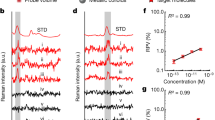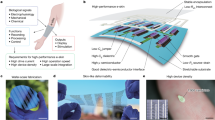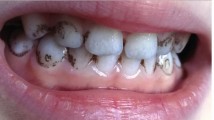Abstract
IN connexion with some recent legal proceedings, a new method for detecting fingerprints has been discovered by one of us (S. O.). The method involves the well-known ninhydrin test for amino-acids, often used in chromatography. In this method, fingerprints on paper have always been considered a great nuisance, and one is often recommended to use forceps “to avoid fingerprints”1. In our opinion, the new method will be most suitable for detecting fingerprints on paper and similar materials. Some of the results have a wider interest, and a brief report on the new application of ninhydrin is therefore presented.
This is a preview of subscription content, access via your institution
Access options
Subscribe to this journal
Receive 51 print issues and online access
$199.00 per year
only $3.90 per issue
Buy this article
- Purchase on Springer Link
- Instant access to full article PDF
Prices may be subject to local taxes which are calculated during checkout
Similar content being viewed by others
References
Levy, A. L., and Chung, D., Anal. Chem., 25, 396 (1953).
Hier, S. W., Cornbleet, T., and Bergeim, O., J. Biol. Chem., 166, 327 (1946).
Author information
Authors and Affiliations
Rights and permissions
About this article
Cite this article
ODÉN, S., HOFSTEN, B. Detection of Fingerprints by the Ninhydrin Reaction. Nature 173, 449–450 (1954). https://doi.org/10.1038/173449a0
Issue Date:
DOI: https://doi.org/10.1038/173449a0
This article is cited by
-
Survey reaction of 2-amino-N-(aryl) benzimidamides with ninhydrin in different conditions and investigation of reaction mechanism using density functional theory (DFT)
Molecular Diversity (2023)
-
Novel C stain-based chemical method for differentiating real and forged fingerprints
Egyptian Journal of Forensic Sciences (2020)
-
Lipophilic magnetic nanocomposite of Fe3O4@SiO2@Me for efficient visualization of latent fingerprints on various surfaces
Journal of the Iranian Chemical Society (2019)
-
A general powder dusting method for latent fingerprint development based on AIEgens
Science China Chemistry (2018)
-
DFT and TDDFT investigation of the Schiff base formed by tacrine and saccharin
Journal of Molecular Modeling (2017)
Comments
By submitting a comment you agree to abide by our Terms and Community Guidelines. If you find something abusive or that does not comply with our terms or guidelines please flag it as inappropriate.



